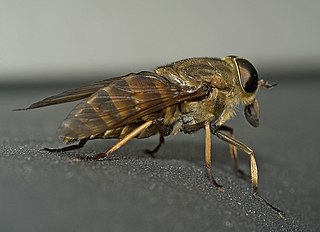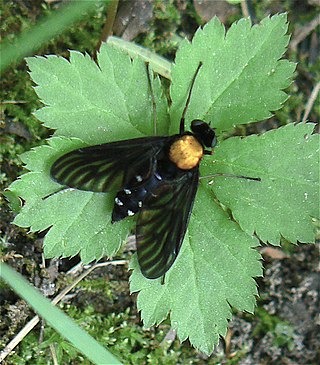
The Brachyceran infraorder Tabanomorpha is a small group that consists primarily of two large families, the Tabanidae and Rhagionidae, and an assortment of very small affiliated families, most of which have been included within the Rhagionidae.

The Brachyceran family Vermileonidae is a small family of uncertain affinities and unusual biology. It includes fewer than 80 described species, most of them rare and with restricted distribution, in 10 genera. Historically the vermileonids had been regarded as belonging to the family Rhagionidae, possibly in a subfamily Vermileoninae. Their biology and morphology are so markedly distinct from the main Rhagionidae sensu stricto however, that the placement as a separate family has been widely accepted.

British Soldierflies and their allies is a book by Alan E. Stubbs and Martin Drake, published by the British Entomological and Natural History Society in 2001. A second edition was published in 2014.

Chrysopilus is common, worldwide genus of predatory snipe flies. There are approximately 300 species in the genus, including fossil members that are sometimes found in amber.

Rhagionidae or snipe flies are a small family of flies. They get their name from the similarity of their often prominent proboscis that looks like the beak of a snipe.

Symphoromyia is a genus of predatory snipe flies. Unusually for Rhagionids, some species of Symphoromyia are known to feed on mammal blood, including human blood. Symphoromyia species are stout bodied flies from 4.5 to 9 mm and with a black, grey or gold thorax, and the abdomen is coloured grey, black, or both black and yellow, black terminating with yellow, to completely yellow. The wings are hyaline or lightly infuscate.

Ptiolina is a genus of snipe flies of the family Rhagionidae,. Examples are found in Northwest Europe, where it prefers woodlands areas. and North America
Spania is a genus of snipe flies of the family Rhagionidae.
Austroleptis is a genus of snipe flies, and the sole genus in the family Austroleptidae; until 2010, it was placed in the family Rhagionidae. They are small to moderately sized flies of around 3 to 7.7 mm.
Omphalophora is a genus of snipe flies of the family Rhagionidae. They are delicate to fairly robust flies, from 3 to 10 mm. they are entirely black or brown in colour.

Rhagio scolopaceus is a species of fly from the family Rhagionidae. It is also known as the downlooker snipefly. It is the type species of the genus Rhagio.

Rhagio mystaceus, also known as the down-looker fly, downlooker snipefly and common snipe fly, is a species of fly from the family Rhagionidae.
Brian Roy Stuckenberg (1930–2009) was a South African entomologist who specialised in Diptera.

Chrysopilus cristatus, is a species of 'snipe flies' belonging to the family Rhagionidae.

Ptiolina obscura is a species of 'snipe flies' belonging to the family Rhagionidae.
Chrysopilus pilosus is a species of snipe fly in the family Rhagionidae.
Chrysopilus andersoni is a species of snipe fly in the family Rhagionidae.

Chrysopilus erythrophthalmus is a Palearctic species of snipe fly in the family Rhagionidae.

Chrysopilus laetus is a Palearctic species of snipe fly in the family Rhagionidae.
Chrysopilus ater is a species of snipe fly in the family Rhagionidae










